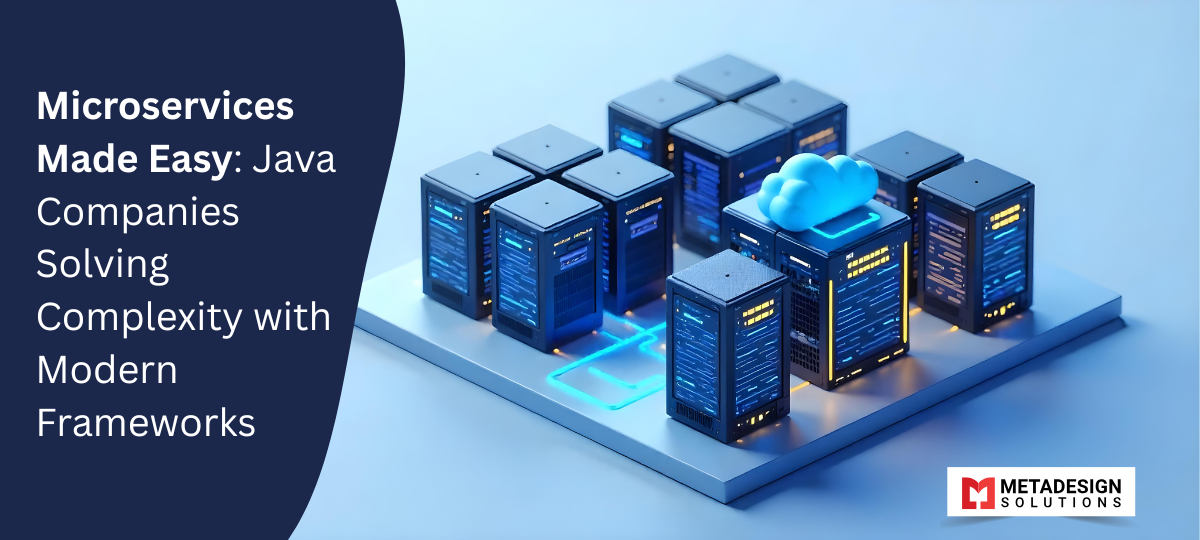In today’s enterprise tech landscape, microservices have become the dominant architecture style for building distributed systems. But while they offer agility, scalability, and modularity, they also introduce complexities in orchestration, deployment, observability, and maintainability.
Java companies, in particular, are leading the charge in solving these challenges using modern frameworks like Spring Boot, Micronaut, and Quarkus. These tools abstract much of the complexity and enable development teams to build scalable, performant, and resilient microservices faster than ever before.
In this blog, we explore how Java-centric development shops solve the chaos of microservices using new-age frameworks—with sample code, architecture insights, and links to advanced strategies.
Why Microservices Introduce Complexity
Microservices split an application into many small, independently deployable services. While this modularity is powerful, it creates challenges such as:
- Managing distributed communication
- Ensuring fault tolerance and service discovery
- Consistent configuration across services
- Observability and debugging
- Deployment orchestration
Java companies address these concerns with tailored architecture patterns and purpose-built frameworks.
To get a broader picture of microservices fundamentals, check out our guide on building scalable and maintainable Java microservices.
1. Spring Boot + Spring Cloud: The Enterprise Workhorse
Spring Boot remains the go-to framework for Java microservices. It offers convention-over-configuration, embedded servers, and seamless integration with Spring Cloud for distributed concerns.
Key Features:
- Autoconfiguration
- Embedded Tomcat/Jetty
- REST API development with ease
- Service discovery via Eureka
- Circuit breakers with Resilience4j
@SpringBootApplication
@RestController
public class ProductService {
public static void main(String[] args) {
SpringApplication.run(ProductService.class, args);
}
@GetMapping("/products")
public List<String> getProducts() {
return List.of("Laptop", "Mobile", "Tablet");
}
}
Java Companies Solving Complexity with Modern Frameworks
Struggling with monolithic bottlenecks? Discover how leading Java development companies simplify microservices using Spring Boot, Quarkus, and cloud-native tools.
Unlock scalable, modular, and maintainable architectures—start your transformation today.
Using Spring Cloud Gateway and Config Server, Java teams manage distributed routing and configuration. Learn more about Java developer roles involved in such architecture in our blog on Java App Developer vs Java EE Developer.
2. Micronaut: Lightweight and AOT-Optimized
Micronaut is an innovative JVM framework with an emphasis on compile-time dependency injection, fast startup time, and minimal memory footprint.
Ideal For:
- Serverless functions
- Low-resource microservices
- Fast-boot applications
@Controller("/orders")
public class OrderController {
@Get("/")
public List<String> list() {
return List.of("Order1", "Order2", "Order3");
}
}
Micronaut is annotation-light and integrates easily with Kafka, gRPC, RabbitMQ, and more. Java shops prefer it for edge computing and event-driven systems.
3. Quarkus: Cloud-Native and Kubernetes-Ready
Quarkus is gaining traction among Java developers building cloud-native microservices. With support for GraalVM native image compilation, Quarkus delivers near-instant startup times and lower resource usage.
Benefits:
- Native compilation (GraalVM)
- Dev mode with hot reload
- Kubernetes and OpenShift support
@Path("/payments")
public class PaymentResource {
@GET
@Produces(MediaType.APPLICATION_JSON)
public List<String> getPayments() {
return List.of("PayPal", "Stripe", "Razorpay");
}
}
With Quarkus, Java teams build containers that start up in milliseconds and integrate deeply with OpenTelemetry, Prometheus, and OpenAPI.
4. Observability and Monitoring with ELK Stack
Observability is mission-critical in microservices. Java companies often use the ELK stack (Elasticsearch, Logstash, Kibana) combined with metrics tools like Prometheus and Grafana.
To learn how we set up ELK for Node.js and Java ecosystems, read our detailed ELK monitoring tutorial.
5. API Gateway, Security, and CI/CD Integration
A comprehensive microservices system includes:
- Spring Cloud Gateway or Kong for request routing
- OAuth2 or JWT-based authentication
- Containerized deployments with Docker and Kubernetes
- CI/CD pipelines using Jenkins, GitHub Actions, or GitLab CI
Dockerfile Example (Spring Boot)
FROM openjdk:17-jdk
ARG JAR_FILE=target/*.jar
COPY ${JAR_FILE} app.jar
ENTRYPOINT [“java”, “-jar”, “/app.jar”]
6. Embracing Java 22 for Microservices Performance
With the release of Java 22, features like Virtual Threads 2.0 and Foreign Function Interface (FFI) offer major performance gains in microservices.
Read our full coverage on Java 22’s improvements for cloud-native workloads.
Conclusion
Microservices demand a robust, scalable architecture—and Java companies are rising to the challenge. By leveraging frameworks like Spring Boot, Micronaut, and Quarkus, they are reducing complexity, improving performance, and accelerating delivery.
When paired with modern Java features, cloud-native DevOps practices, and observability tooling, these frameworks empower teams to deliver reliable distributed systems at scale.
If you’re building Java microservices and want expert guidance, MetaDesign Solutions offers full-stack Java development development services, microservices architecture consulting, and end-to-end implementation services.
Hashtag Related:
#JavaMicroservices #SpringBoot #Micronaut #Quarkus #JavaDevelopment #CloudNative #MicroservicesArchitecture #DevOps #Java22 #DistributedSystems #APIgateway #Kubernetes #MetaDesignSolutions



